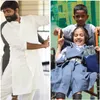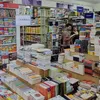Prints, textiles, sculptures: the creative explorations of three award-winning artists
In our two-part photo essay from the Museum of Art and Photography, we showcase a range of artworks and curator insights on creativity.
Launched in 2014, PhotoSparks is a weekly feature from YourStory, with photographs that celebrate the spirit of creativity and innovation. In the earlier 810 posts, we featured an art festival, cartoon gallery. world music festival, telecom expo, millets fair, climate change expo, wildlife conference, startup festival, Diwali rangoli, and jazz festival.
Bengaluru’s Museum of Art and Photography is showcasing two creative exhibitions this month, titled Rhyme Unbroken and Outside In. See our coverage of earlier events at this popular venue here.

The art exhibition Rhyme Unbroken features the work of printmaker, sculptor and educator Krishna Reddy, who was honoured with both the Padma Shri and Kala Ratna awards. Co-curated by MAP’s Kuzhali Jaganathan and Arnika Ahldag, it presents 40 of his artworks as part of his centenary year celebration.
Artistic styles such as replication appear in his prints as well as sculptures. “He combined engraving, acid biting, and aquatint in unique ways,” curator Jaganathan tells YourStory. Reddy believed that learning and knowledge extend beyond classrooms to human cohabitation with the universe.
Born and raised in Andhra Pradesh in the 1920s, Reddy studied at Shantiniketan and was later mentored by artists like Nandalal Bose. His graphic artworks reflect influences of modernism, and he was a proponent of artistic expression as a continuum of discovery and experimentation.

“He keenly followed developments around the world. He was deeply affected by the sorrow and violence in the world, but he sought to rise above it and foster an environment of equality,” Jaganathan adds. Reddy created a series of diverse prints that had international resonance.
The other exhibition titled Outside In features 26 sculptures of Meera Mukherjee and Jaidev Baghel, along with six textile works. The innovative exhibits reflect the influence of indigenous crafts and artistic identity.
Mukherjee (1923–1998) studied in India and Germany. She practiced a wax-casting method known as Bastar Dhokra. She also collaborated with women in Bengal in textile art through kantha pieces.

“Mukherjee’s sculptures often emphasise thin, elongated forms, which contrast with more realistic body representations but provide a stylistic twist,” Jaganathan explains.
Baghel (1949–2014) reimagined traditional craft techniques in his works, and was inspired by folklore and mythology. Some of his techniques involved processes like making clay molds, coiling, and smoothing.
In Part II of this photo essay, we share more artworks and curator insights from MAP. Launched in 2023, the five-storeyed museum includes an auditorium, library, and sculpture courtyard. Its digital museum connects with audiences through curated online exhibitions, panels, and workshops, thus bringing Indian art to a global audience as well.
Now what have you done today to pause in your busy schedule and harness your creative side for a better world?















(All photographs were taken by Madanmohan Rao on location at MAP.)
Edited by Megha Reddy










